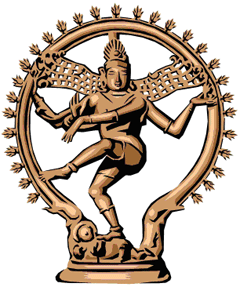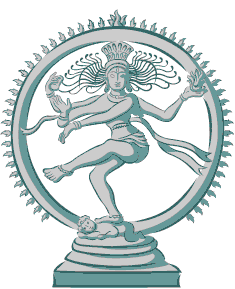| Free Jyotish Newsletter |
 Jyotish.ws
Jyotish.wsMahashivaratri 2005
By Paul Muller-Ortega, rashivam@rochester.rr.com
 The great night of Lord Shiva approaches, Mahashivaratri, one of the most ecstatic and yogically meaningful of all the holy celebrations in the Hindu calendar. It celebrates the reality and blessings of Shiva Mahadeva, the Great God, the Lord of Yoga, and the AdiGuru, the primordial teacher and liberator of humanity. On this night, Shiva beckons his devotees to catch a glimpse of him, and to taste the exquisite reality of his being. Devotees fast and keep a night vigil in temples and shrines, worshipping Lord Shiva through meditation on the Absolute, through rituals of devotion, through the repetition of his mantras, and through telling traditional tales.
The great night of Lord Shiva approaches, Mahashivaratri, one of the most ecstatic and yogically meaningful of all the holy celebrations in the Hindu calendar. It celebrates the reality and blessings of Shiva Mahadeva, the Great God, the Lord of Yoga, and the AdiGuru, the primordial teacher and liberator of humanity. On this night, Shiva beckons his devotees to catch a glimpse of him, and to taste the exquisite reality of his being. Devotees fast and keep a night vigil in temples and shrines, worshipping Lord Shiva through meditation on the Absolute, through rituals of devotion, through the repetition of his mantras, and through telling traditional tales.It is said that when the creation of all the worlds had been completed, Shiva and Parvati were dwelling on the peak of Mt. Kailasa. Devi inquired of Lord Shiva, saying, "O Venerable Lord! Which of the many rituals observed in your honor pleases you the most?" Lord Shiva replied: "O Goddess, my favorite is the observance of the Mahashivaratri vow, on the fourteenth night of the new moon during the dark half of the lunar month of Phalguna."
Mahashivaratri is a time of great blissfulness: it is said to be the time to have the vision of Shiva as the Absolute consciousness brimming over with bliss and love. Mahashivaratri is observed as a vrata, a solemn vow of austerity. Devotees and yogic practitioners take a vow to redouble their efforts and dedication in the performance of spiritual practices. In order to entice his myriad devotees into this vow of austerity, Shiva declares that all spiritual practices performed on this night will bear fruit a thousand-fold.
The Garuda Purana charmingly narrates the blessings of this night. Once upon a time King SundaraSena, who was not at all known for his virtue or kindness, ruled over the land of the Nishadas. One day, he went out with his dogs on a hunting excursion in the forest. The day wore on and the night came without any game being sighted. The King, hungry and tired by this fruitless day, sat down weary and watchful in a bower of trees on the bank of a pool.
Unbeknownst to the King, there happened to be a Shivalinga there. The linga is the holy emblem of Lord Shiva, the form through which he is traditionally worshipped. Close by, there was a bilva tree which was shaken by the impact of the hunter's body as he strove to make himself comfortable lying on the ground. Without the King noticing it, some of the leaves of the bilva tree fell in heaps over the linga emblem of Shiva. Later, the King fetched some water to sprinkle on the ground and so settle the choking dust, and quite by accident some drops of water spilled from his fingers onto the linga. Suddenly, one of the arrows from his quiver fell onto the ground. He crawled on all fours to retrieve it, thus unknowingly bowing before the linga. Thus he touched, bathed and worshipped the linga on the night of Mahashivaratri, and passed the rest of the night awake, guarding himself and his dogs from wild beasts.
 The next day the king returned to his family, and the years passed away in his undistinguished and not very pure life. At the end of his appointed days, the messengers of Yama, the Lord of death, came to take his spirit, which was sure to adjudged as destined for a less-than-pleasant afterlife. But, just then Shiva and his ganas (his troop or army), intercepted and overpowered the messengers of Lord Death, and abducted the King. Bringing him to Shivaloka, the realm of Shiva, the King thus attained the blessed domain of bliss and freedom. This intervention of Shiva was due entirely to the unconscious devotion practiced by the King that one night on MahaShivaratri.
The next day the king returned to his family, and the years passed away in his undistinguished and not very pure life. At the end of his appointed days, the messengers of Yama, the Lord of death, came to take his spirit, which was sure to adjudged as destined for a less-than-pleasant afterlife. But, just then Shiva and his ganas (his troop or army), intercepted and overpowered the messengers of Lord Death, and abducted the King. Bringing him to Shivaloka, the realm of Shiva, the King thus attained the blessed domain of bliss and freedom. This intervention of Shiva was due entirely to the unconscious devotion practiced by the King that one night on MahaShivaratri.
This charming puranic tale carries a simple moral. On this night, the mysterious and exalted Lord grants his darshan to those who perform this vow. In traditional language, it is said that the great Lord descends from his cloud-hidden lair on the summit of Mt. Kailas, and wanders the earth granting sublime vision, inner torrents of bliss, and subtle insights and powerful transformations to all his devotees. Lord Shiva is called the Lord of the Cave of the Heart, hidden away from view. But on Mahashivaratri, devotees keep a night vigil with the hope and intention of catching just a glimpse of his spiritual reality. As the tale shows, on this night even the unconscious performance of spiritual practices brought great merit to the king and earned him rebirth in Shivaloka. Shiva is called "the deity who is easily pleased": even a little of spiritual practices, of devotion offered to him, brings much by way of rewards. How much more is to be gained by spiritual practices offered consciously, and with great love and devotion by dedicated and devoted seekers!
©2005 Paul Muller-Ortega.
About the Author: Paul Muller-Ortega, Ph.D. is Professor of Religion at the University of Rochester in Rochester, New York. He is the author of the 1989 book The Triadic Heart of Shiva: Kaula Tantricism of Abhinavagupta in the Non-Dual Shaivism of Kashmir.
From the February, 2005 issue of Michael Laughrin's North American Jyotish Newsletter. Click to subscribe to this free Jyotish newsletter.
Read more articles.
Yagyas offered by Michael Laughrin.